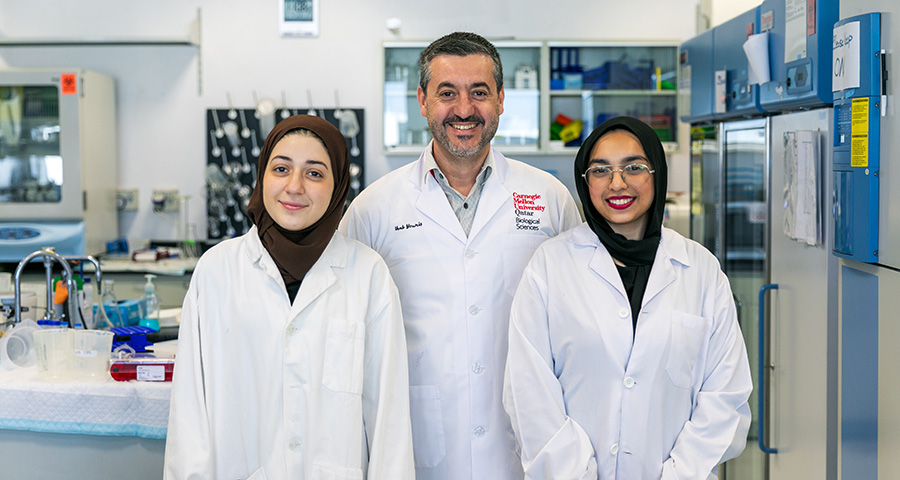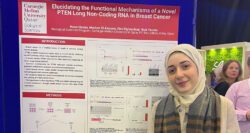
Bio sci students present research at international breast cancer conference
Two graduating seniors at Carnegie Mellon University in Qatar (CMU-Q) presented their research findings at the UK Interdisciplinary Breast Cancer Symposium in Birmingham, United Kingdom. Hana Hasna and Fiza Tarlochan were the only two undergraduates with posters accepted to the biennial conference that features medical and research professionals from many disciplines.
Ihab Younis, associate teaching professor and the area head of biological sciences, served as faculty advisor for both projects.
“Hana and Fiza have done exceptional work on their projects, and I am very proud to see them standing shoulder to shoulder with much more experienced researchers,” he said. “We emphasize research, creativity, and critical thinking in our biological sciences program, and I see very bright futures in research for both of them.”

Hana Hasna at the Fiza Tarlochan at the UK Interdisciplinary Breast Cancer Symposium.
Through her research, Hasna has uncovered a novel mechanism to slow down the production of PTEN, a protein known to promote cancer cell growth. The discovery could lead to treatments that more effectively target and shut down tumor cells.
“Cancer cells really want to regulate how much PTEN they make,” said Younis. “This protein dictates how fast or slow cancer cells grow. As far as I can tell, no other researchers are looking at the mechanism Hana has uncovered, so this is new territory.”
Hasna is inspired by her research experience: “It’s overwhelming, but it’s also very rewarding. I’m so thankful to have this opportunity to work on this research. And it feels like I’m doing something that’s really important.”
Tarlochan is working on a different aspect of breast cancer cell growth that targets a specific gene. She has discovered that when you limit the processing of this gene, cancer cells will die and healthy cells are not affected.
Younis explains: “To put this in context, Fiza has identified a gene that is essential to all cells, but if you inhibit the process only by, let’s say, 10 or 20 percent, cancer cells will die but other cells will continue to live. And no one before has identified this function for this gene.”
Through her experience in Younis’ lab, Tarlochan has been inspired to pursue a career in research: “Professor Younis gives us the independence to come up with our ideas or theories. It’s very encouraging, and I want to see where this can take me.”

Fiza Tarlochan at the UK Interdisciplinary Breast Cancer Symposium.
Both students will graduate in May 2024 with degrees in biological sciences from CMU. They both plan to further their studies in graduate school.
